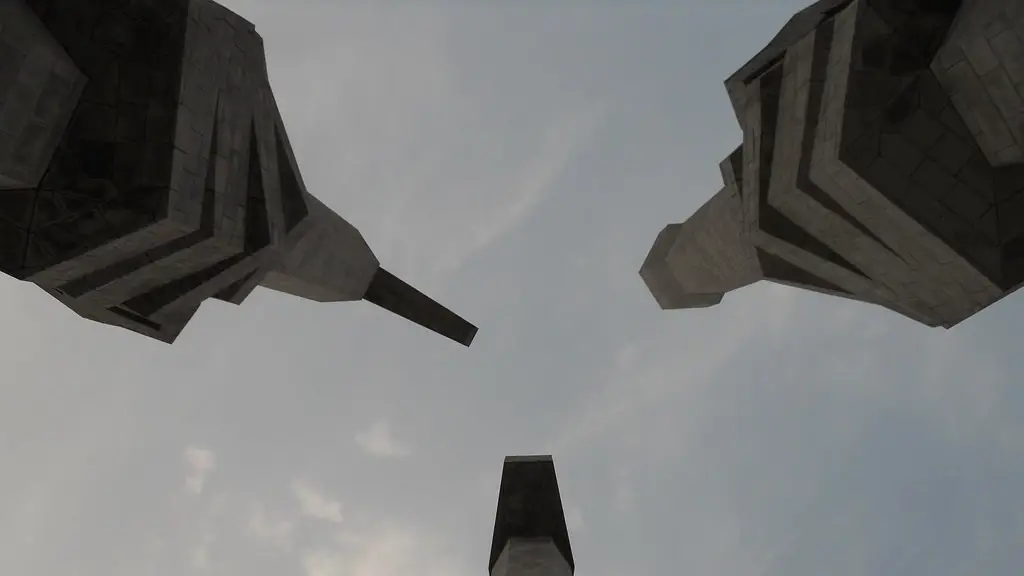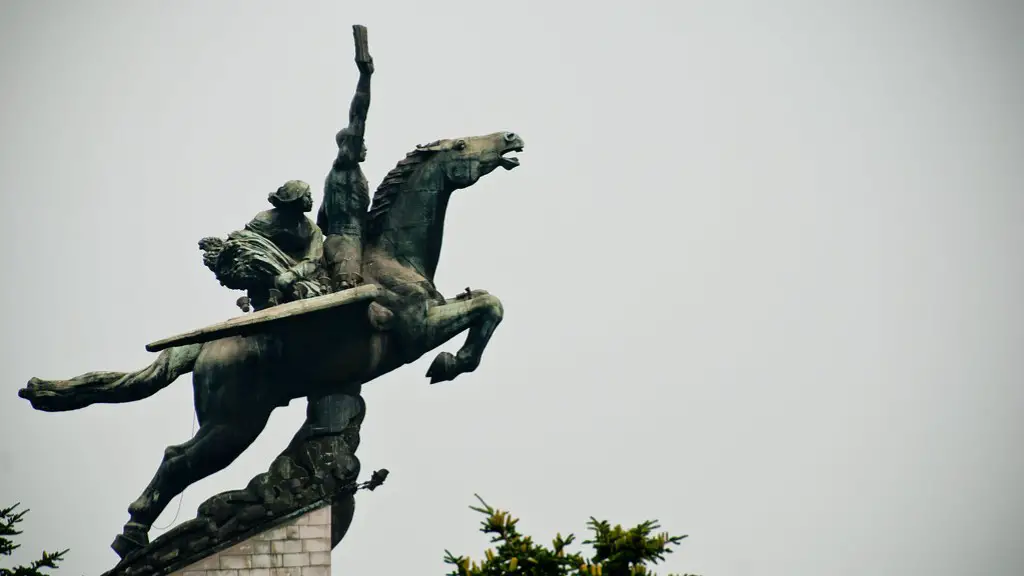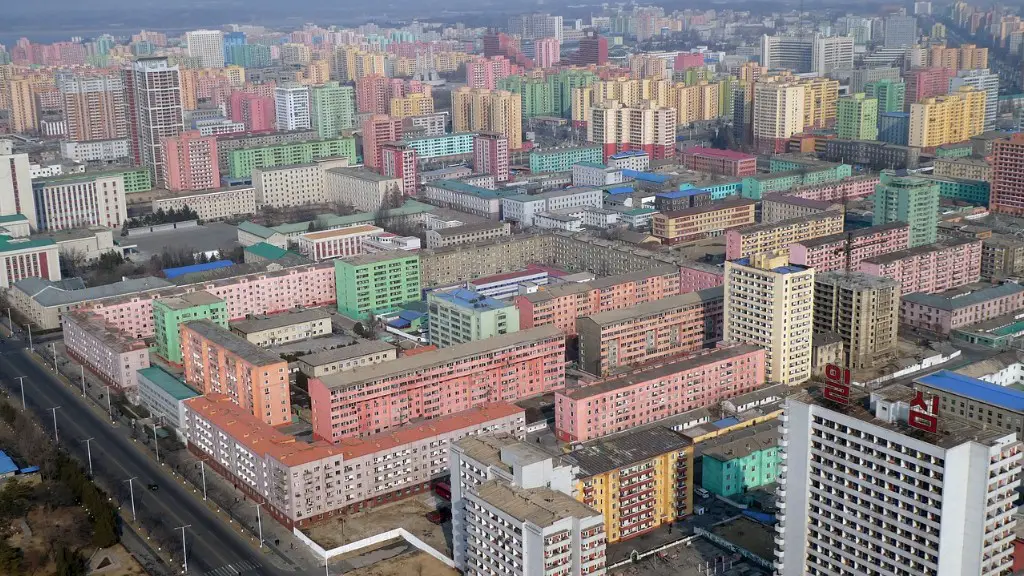The prospect that the North Korean people could one day revolt against their government and bring change to the isolated country appears to be very unlikely. Despite the grim conditions that the population in North Korea frequently face, there are several reasons why the people of North Korea are unlikely to revolt against the regime in the near future.
North Korea has one of the most authoritarian and oppressive regimes in the world. The ruling family of North Korea, the Kims, have kept a tight grip on their population, using a range of techniques including heavily restricting access to information and punishing those who speak against the government. For example, any North Korean citizens suspected of speaking out against the government are swiftly arrested, sent to prison camps, and detained indefinitely. In addition, the population is subjected to a system of surveillance and informers, which makes defiance even more difficult.
Furthermore, the North Korean people have no access to independent sources of information, leaving them completely reliant on the state-controlled media. This allows the regime to brainwash the population into believing whatever they want the people to believe in and prevents the people from gaining any insight into the outside world. This means that the population is unable to develop any kind of critical thinking skills and are kept in the dark about what is really happening in North Korea.
The North Korean people also suffer from poor education and limited access to healthcare. The education system is designed to foster loyalty and obedience to the regime and does not provide the people with the skills, knowledge or resources needed to be able to challenge the government. In addition, healthcare is also severely limited, leaving the population vulnerable to a range of illnesses, diseases, and preventable deaths.
Finally, North Korea has a very strong and powerful military. The country has one of the world’s largest militaries and the government’s use of fear-based tactics have kept the people in a state of submission. For example, the country is known for its harsh punishments, including death sentences, for any kind of perceived act of rebellion. This makes it difficult for any kind of uprising or revolt to take place.
Oppression of Human Rights
The human rights abuses that take place in North Korea are some of the most extreme in the world. The regime has deprived its citizens of essential human rights, including freedom of speech, freedom of thought, freedom of information, freedom of movement, and the right to a fair trial. The people are even denied basic necessities, such as food and clean water. Furthermore, the North Korean government has instituted a system of censorship, which largely prevents the population from having access to any kind of independent media or news.
In addition, the North Korean government has been accused of using tactics of torture and intimidation in order to suppress any kind of dissent or criticism. These tactics include beatings, solitary confinement, starvation, and forced labor. This has created a climate of fear in the country, making it difficult for any kind of revolt or protest to take place.
In order to further prevent dissent and keep the population in line, the government has also implemented a series of public trials, wherein individuals are taken out in public, humiliated by state security forces, and sentenced to long prison sentences without any kind of due process. This tactic has been used to target ordinary citizens as well as government dissidents and foreign journalists.
Furthermore, the North Korean government has deployed an elaborate system of surveillance and informers, which gives the regime an unprecedented level of control over the population. This has enabled the government to track and punish anyone who is suspected of speaking out against the regime.
Economic Struggles
The economic situation in North Korea is dire, and this has had a profound effect on the population. The economy has contracted significantly in recent years, and the government has slashed public spending and instituted austerity measures, resulting in higher prices, lower wages, and increased poverty. Furthermore, The UN has estimated that more than 60 percent of North Koreans are currently living in extreme poverty. The situation is further exacerbated by international sanctions that have been placed on the country.
The lack of economic opportunity and stability has had a significant impact on the stability of the country. Petty crime and corruption are rampant and the North Korean government has been unable to address the situation. This has created an environment of resentment and discontent among the people, leading many to question the legitimacy of the government and prompting some to take up extreme forms of protest such as setting fire to government buildings.
However, these protests are usually met with swift and harsh responses from the government, leading to further resentment and frustration from the public. Furthermore, the government has used these protests as justification to step up its surveillance measures, further restricting the population’s civil liberties. This has made any kind of uprising or revolt even more difficult to achieve.
Cultural Factors
Cultural factors are also a major contributing factor to why North Korea has not revolted yet. The North Korean population is largely isolated from the outside world, and the government has brainwashed the population into believing that they need to be loyal and obedient to the regime. This has created a sense of fear and subordination among the people, making it difficult for them to even contemplate any kind of revolt or uprising.
Furthermore, due to the nature of the society, it has become incredibly difficult for the North Korean population to even come together and discuss any kind of organized action against the regime. This has made it nearly impossible for the people to effectively organize any kind of revolt or uprising.
In addition, North Korea has a deep-seated reverence for the Kims. The ruling family is seen as almost divine by many North Koreans and the idea of challenging the Kims is considered almost heretical in many parts of the country. This means that any kind of uprising or revolt against the regime is seen as a betrayal of the country and its rulers. This has further stifled any kind of collective action by the North Korean people against the government.
International Pressure
The international community has put considerable pressure on North Korea in recent years, in an attempt to make them open up to the rest of the world and improve the human rights situation within the country. This has made some progress in terms of improving the human rights situation, but has done little to improve the economic situation or to promote any kind of internal uprising or revolt.
In addition, the US and other international powers have repeatedly threatened North Korea with military action if they do not comply with their demands. This has made the possibility of an uprising or a revolt even less likely, as the North Korean people are wary of provoking the international community for fear of retribution. Furthermore, the international community does not appear to be doing much to actually help the North Korean people, instead opting to engage in sanctions and threats. This has further demoralized the people and weakened any kind of collective action against the government.
Recent Developments
There have been some recent developments in North Korea, which have given some hope to the people. In 2018, North Korea made the unprecedented move of engaging in diplomacy with the US, agreeing to a summit with Donald Trump in Singapore. This was seen by many as a sign that the regime was willing to make concessions and open up to the outside world.
Furthermore, the North Korean government has recently taken some steps to improving the human rights situation within the country. For example, they have ratified some international human rights treaties and established a new human rights commission. This has led some to think that North Korea is slowly moving away from its authoritarian past, and that change could eventually come to the country.
However, it remains to be seen if these developments will lead to any real change in North Korea. For now, it appears that the North Korean people are unlikely to revolt against their government anytime soon.
Propaganda Machine
The North Korean government has an extensive propaganda machine, which keeps the population in a state of constant fear and submission. This is used to further stifle any kind of dissent or criticism, by making the North Korean people believe that dissent is dangerous and can lead to severe punishments. This has created a climate of fear and apathy in the country, making it difficult for any kind of collective action to be taken by the people.
Furthermore, the North Korean government’s use of propaganda has led to a distortion of reality, with many North Koreans believing the government’s version of the truth, rather than the reality. This has made it difficult for the people to be able to tell fact from fiction, and has further weakened any kind of opposition movement.
In addition, the government has also used its propaganda machine to justify its oppressive policies and to keep the population loyal to the regime. For example, the government has disseminated stories and movies celebrating the achievements of the leadership and emphasizing the importance of loyalty to the regime. This has created a culture of fear and submission, leading many North Koreans to be wary of speaking out against the government.
Conclusion of Fear
The North Korean people are subjected to a range of extreme measures that make any kind of revolt or uprising extremely difficult. The oppressive regime has deprived its population of basic human rights and fundamental freedoms, resulting in a climate of fear and submission. In addition, the population is kept isolated from the outside world and are kept in the dark about what is really happening in the country.
Furthermore, the North Korean government has an extensive propaganda machine, which is used to further stifle any kind of dissent or criticism. This has created an environment of fear, apathy, and mistrust among the population, making it difficult for any kind of collective action to take place.
Finally, recent developments, such as the US-North Korea summit, have given some hope to the people, but it remains to be seen if these developments will lead to any real change in North Korea. For now, it appears that the North Korean people are unlikely to revolt against their government anytime soon.





